
WATER RESOURCES MANAGEMENT
Scope & Guideline
Exploring the Frontiers of Water Science and Engineering
Introduction
Aims and Scopes
- Integrated Water Resource Management (IWRM):
This area emphasizes the holistic management of water resources, considering the interconnections between different water uses and the environment to promote sustainability and equity. - Climate Change Impact Analysis:
Research in this area focuses on understanding how climate change affects water availability, quality, and management practices, providing insights for adaptation strategies. - Hydrological Modeling and Simulation:
This includes the development and application of various modeling techniques to predict hydrological responses, assess flood risks, and optimize water resource allocation. - Data-Driven Decision Making:
Utilizing machine learning, artificial intelligence, and statistical methods to enhance decision-making processes in water resource management, particularly under uncertainty. - Ecological Water Management:
This scope involves studies that integrate ecological considerations into water management practices, ensuring that ecosystems are preserved and restored while meeting human needs. - Water Quality Assessment and Monitoring:
Research focusing on the methodologies for assessing and monitoring water quality, including the development of indices and management strategies to mitigate pollution. - Socioeconomic Impacts of Water Management:
Exploring the social and economic dimensions of water resource management, including stakeholder engagement, policy implications, and the economics of water use.
Trending and Emerging
- Machine Learning and Artificial Intelligence Applications:
There is a significant increase in research utilizing machine learning and AI techniques for predictive modeling, optimization, and data analysis in water resource management. - Nature-Based Solutions (NbS) for Water Management:
Research focusing on nature-based solutions, such as green infrastructure and sustainable land use practices, is gaining traction as a means to enhance resilience to climate change and improve water quality. - Integrated Water-Energy-Food Nexus:
Emerging studies are increasingly addressing the interconnectedness of water, energy, and food systems, emphasizing the need for integrated management strategies to optimize resources. - Community Engagement and Stakeholder Participation:
Research is trending towards incorporating community perspectives and stakeholder participation in water management decisions, reflecting a shift towards more democratic governance models. - Resilience and Adaptation Strategies:
There is a growing emphasis on developing strategies for resilience and adaptation in water management to cope with climate variability and extreme weather events. - Smart Water Management Technologies:
Innovations in smart technologies, including IoT and real-time monitoring systems, are becoming a focal point for enhancing the efficiency and effectiveness of water resource management.
Declining or Waning
- Traditional Hydrological Approaches:
There has been a noticeable decline in the publication of papers focusing solely on traditional hydrological methods without integrating modern technologies, such as machine learning or hybrid modeling approaches. - Conventional Water Supply Systems:
Research specifically centered on conventional water supply systems is decreasing, as the focus shifts toward more innovative and sustainable practices including decentralized systems. - Single-Disciplinary Studies:
The trend is moving away from studies that do not incorporate interdisciplinary approaches, which are becoming less relevant in the context of complex water management issues. - Static Water Quality Assessment Methods:
Static approaches to water quality monitoring are being overshadowed by dynamic and real-time monitoring methods that utilize advanced sensor technologies and data analytics.
Similar Journals
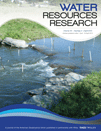
WATER RESOURCES RESEARCH
Pioneering Research for a Water-Secure FutureWATER RESOURCES RESEARCH, published by the American Geophysical Union, stands as a premier journal in the field of environmental science, specifically within the domain of water science and technology. With an impressive impact factor and a categorical ranking of Q1 for 2023, it ranks within the top 10% of relevant journals, evidencing its critical role in advancing the knowledge and application of water resources research. Since its inception in 1965, the journal has been dedicated to rigorous research that addresses pressing global challenges related to water resource management, hydrology, and environmental sustainability. The journal's comprehensive publication scope aims to present innovative findings and methodologies that can shape effective policies and practices. Although it does not offer open access, the robust research it publishes continues to influence academics and practitioners alike, ensuring its position as an essential resource for anyone engaged in the pursuit of water-related knowledge and solutions.
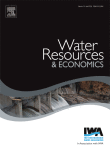
Water Resources and Economics
Pioneering Research for a Sustainable Water Future.Water Resources and Economics, published by Elsevier, is a prestigious journal that bridges the gap between water resource management and economic theory. With an ISSN of 2212-4284, this journal has been an essential resource in the fields of Economics, Geography, and Water Science since its inception in 2013. Holding a notable Q2 ranking in the 2023 Category Quartiles for Economics and Econometrics, Geography, Planning and Development, and Water Science and Technology, it showcases cutting-edge research that addresses the increasing importance of sustainable water management in a rapidly changing climate. The journal's rigorous peer-review process ensures the dissemination of high-quality studies that influence policy and practice. As it continues to grow within the academic landscape, Water Resources and Economics strives to provide actionable insights and innovative approaches for professionals, researchers, and students invested in the sustainability and economics of water resources. For additional information, please refer to the journal’s website for access and submission guidelines.

H2Open Journal
Unlocking insights in water technology and management.H2Open Journal, published by IWA Publishing, is a leading open-access platform established in 2018, dedicated to advancing the field of water science and technology. With its E-ISSN 2616-6518, this journal caters to a global audience, providing essential research insights that span various domains, including environmental science, management, monitoring, policy, law, and water science. The journal has achieved notable recognition in recent years, holding a Q3 ranking in three distinct categories within the 2023 environmental science metrics. Its commitment to open access ensures that valuable research is freely available to researchers, professionals, and students alike, fostering collaboration and innovation in water-related disciplines. With a focused publication strategy spanning from 2018 to 2024, H2Open Journal is poised to be a pivotal resource for addressing critical challenges in water sustainability and management, reflecting the pressing need for informed actions in the face of global water issues.

Water Resources
Pioneering interdisciplinary research for water resilience.Water Resources, a prominent journal published by MAIK NAUKA/INTERPERIODICA/SPRINGER, focuses on the critical and evolving field of water science and technology. Established in 1976 and with a long-standing commitment to advancing knowledge, this journal explores interdisciplinary research that addresses the challenges surrounding water resource management, quality, and sustainability. With an impact factor positioned within the Q3 category of its field, it holds a notable Scopus rank (#181/261) in Environmental Science, emphasizing its role in driving scholarly discourse. While currently not open access, Water Resources provides vital insights for researchers, professionals, and students, making it an essential resource for those seeking to innovate and implement effective water management solutions. To stay ahead in a domain that is increasingly paramount to global sustainability efforts, consider engaging with the latest research published in this vital journal.
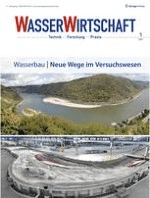
WasserWirtschaft
Elevating discourse on critical water resource challenges.WasserWirtschaft is a renowned academic journal dedicated to the critical field of water science and technology. Published by SPRINGER VIEWEG-SPRINGER FACHMEDIEN WIESBADEN GMBH, this journal has been a vital resource for researchers, professionals, and students since its inception in 1973, covering an extensive range of topics pertinent to water management, engineering, and environmental sustainability. Although it is currently ranked in the Q4 category of the Water Science and Technology category as per the 2023 Scopus metrics, with a ranking of #246 out of 261, the journal is committed to enhancing the discourse surrounding water resource management through high-quality, peer-reviewed articles. The journal does not operate on an Open Access basis, ensuring that its content is curated and accessible to subscribers while promoting rigorous academic standards. With its historical significance and focus on contemporary water-related challenges, WasserWirtschaft remains an essential publication for stakeholders aiming to advance the science and technology of water resources in a rapidly changing world.
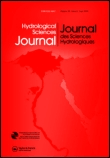
Hydrological Sciences Journal
Elevating understanding of our vital water systems.Hydrological Sciences Journal, published by Taylor & Francis Ltd, is a leading peer-reviewed publication dedicated to advancing the field of hydrology, spanning topics from water management to climate impacts on hydrological systems. With an impressive impact factor and a noted Q1 category ranking in Water Science and Technology, the journal occupies a pivotal role in the academic landscape, facilitating high-quality research dissemination since its inception in 1982. The journal is indexed in Scopus, holding a commendable rank of #48 out of 261 in the Environmental Science category, placing it in the 81st percentile among its peers. Although it does not offer Open Access options, the journal ensures extensive reach and readership through institutional subscriptions. As it converges toward its milestone of 2024, the Hydrological Sciences Journal remains an indispensable resource for researchers, professionals, and students eager to explore the latest advancements and methodologies in hydrological research.
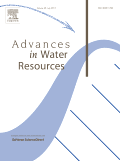
ADVANCES IN WATER RESOURCES
Pioneering research that shapes water sustainability.ADVANCES IN WATER RESOURCES is a premier peer-reviewed journal published by Elsevier Science Ltd, dedicated to advancing the field of water science and technology since its inception in 1977. With an impressive Q1 ranking in the field, this journal provides a vital platform for researchers, professionals, and students to disseminate cutting-edge research that addresses critical issues related to water resources management, hydrology, and environmental sustainability. The journal offers a comprehensive collection of articles that explore innovative methodologies, policy implications, and case studies that shape the future of water resource management. Although it does not provide open access, its impactful contributions are recognized globally, making it an essential resource for anyone engaged in water science. The journal continues to publish relevant research while looking forward to bridging the gap between theoretical insights and practical applications up until 2024.

Water
Connecting researchers to tackle urgent water issues.Water, an esteemed journal published by MDPI, serves as a pivotal resource for global research in the fields of aquatic science, biochemistry, geography, and water science and technology. Since its inception in 2009, this open-access journal has committed itself to advancing knowledge regarding water-related topics by fostering a platform that encourages the dissemination of high-quality research. With its impressive impact factor reflecting its relevance and influence, Water ranks in the top quartiles in various categories, including Q1 in Aquatic Science and Water Science and Technology, showcasing its commitment to publishing cutting-edge findings that resonate deeply with the environmental and biological sciences community. Located in Basel, Switzerland, the journal prioritizes accessibility for researchers, professionals, and students alike, aligning with the broader scientific goal of addressing urgent water challenges through collaborative and interdisciplinary research.
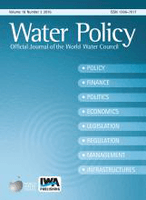
Water Policy
Empowering policymakers with vital insights on water management.Water Policy is a leading academic journal published by IWA PUBLISHING, dedicated to advancing the understanding of water management and policy across various disciplines. With a focus on the intricacies of water governance, the journal fosters dialogue among researchers and practitioners by presenting innovative studies and comprehensive analyses. Since transitioning to an Open Access model in 2021, it has increased accessibility to critical research, allowing for a broader reach and greater impact within the water sector. The journal's reputation is underscored by its classification in Q2 and Q3 quartiles in fields such as Geography, Planning and Development, as well as Environmental Science disciplines, marking it as a valuable resource for scholars and policymakers alike. The ISSN 1366-7017 and E-ISSN 1996-9759 facilitate streamlined access to its extensive archive, encouraging wider engagement in pivotal discussions surrounding sustainable water practices. With a commitment to shaping the future of water governance, Water Policy stands as an essential platform for sharing vital research and perspectives that contribute to effective water management globally.
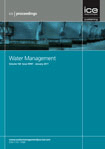
PROCEEDINGS OF THE INSTITUTION OF CIVIL ENGINEERS-WATER MANAGEMENT
Advancing Sustainable Solutions in Water ManagementPROCEEDINGS OF THE INSTITUTION OF CIVIL ENGINEERS-WATER MANAGEMENT is a prestigious journal published by Emerald Group Publishing Ltd, dedicated to advancing the field of water management within civil engineering. With an ISSN of 1741-7589 and an E-ISSN of 1751-7729, this journal delivers peer-reviewed research that spans the critical intersections of water science and technology, contributing valuable insights into sustainable water management practices. As evidenced by its ranking in the 2023 Scopus categories, where it holds the Q3 quartile in Water Science and Technology, and a respectable position among its peers, the journal remains a vital resource for researchers, professionals, and students in the field. Though it is not an open-access journal, it offers accessible subscription options that facilitate worldwide dissemination of knowledge, enhancing its role as a fundamental reference point for cutting-edge developments in water management. For those looking to publish or stay updated on the latest research trends, this journal serves as an essential platform for promoting innovation and sustainable practices in civil engineering and water resources management.